外研版(2019) 必修第二册 Unit 4 Stage and Screen Using language Grammar 课件-(27张ppt)
文档属性
| 名称 | 外研版(2019) 必修第二册 Unit 4 Stage and Screen Using language Grammar 课件-(27张ppt) | 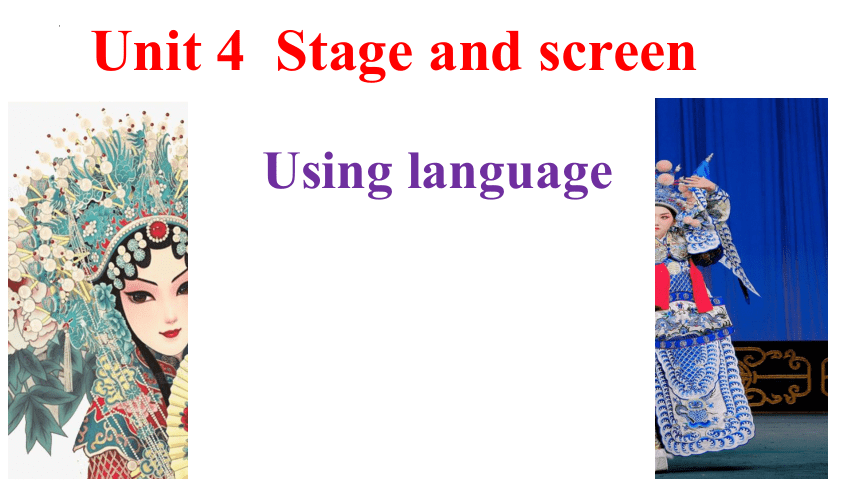 | |
| 格式 | pptx | ||
| 文件大小 | 1.6MB | ||
| 资源类型 | 教案 | ||
| 版本资源 | 外研版(2019) | ||
| 科目 | 英语 | ||
| 更新时间 | 2023-02-16 18:03:28 | ||
图片预览

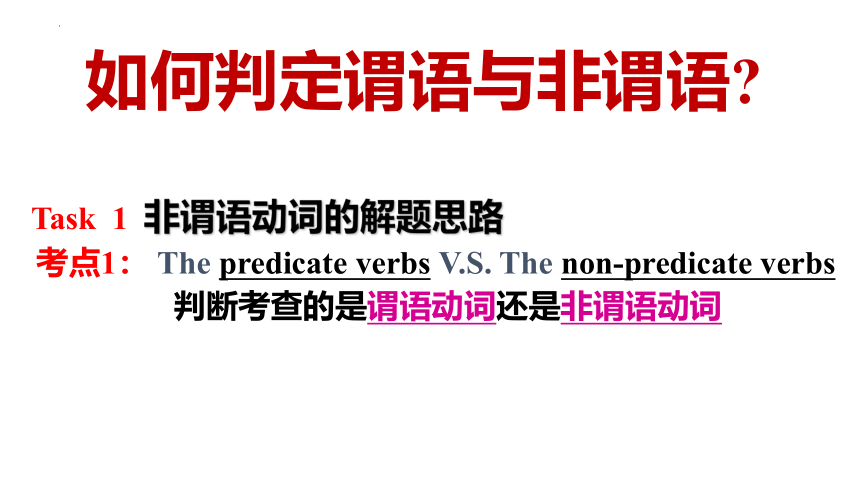
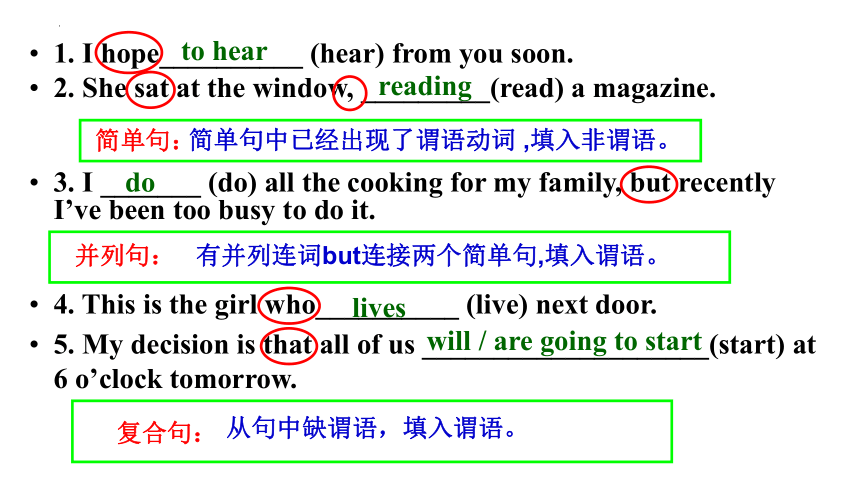
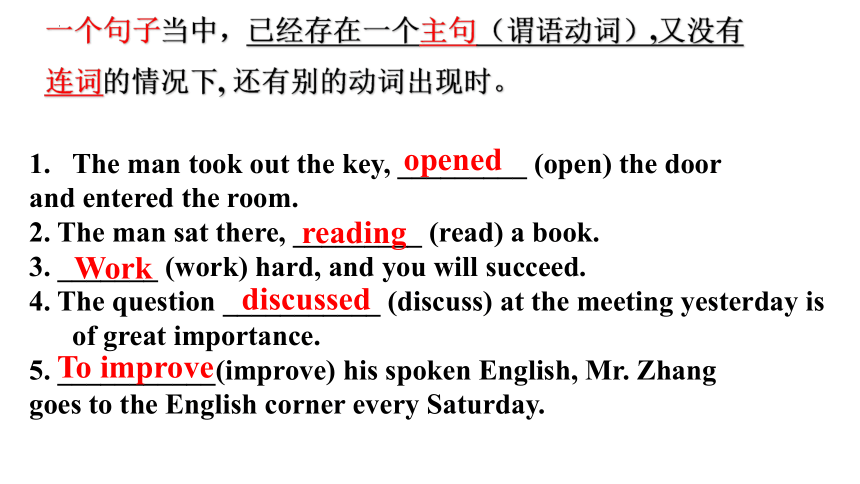
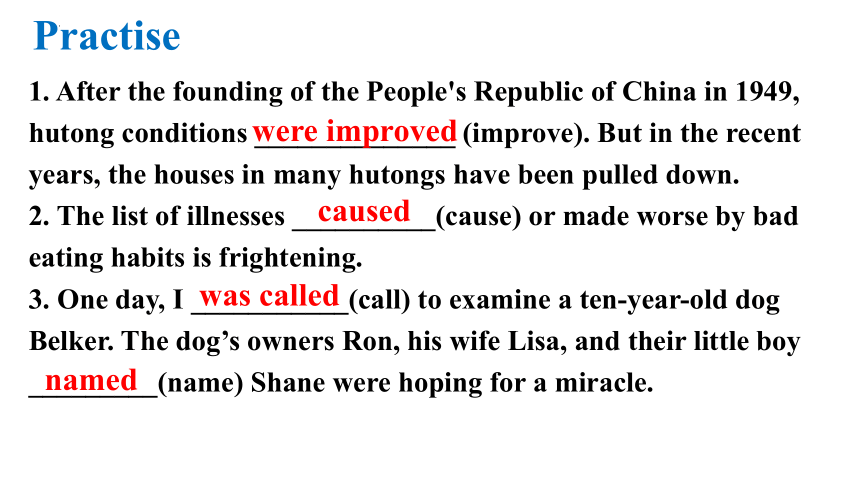
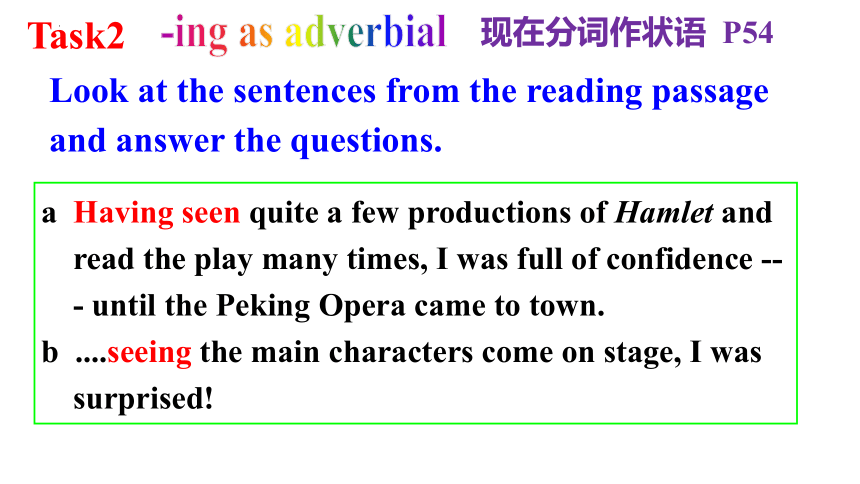
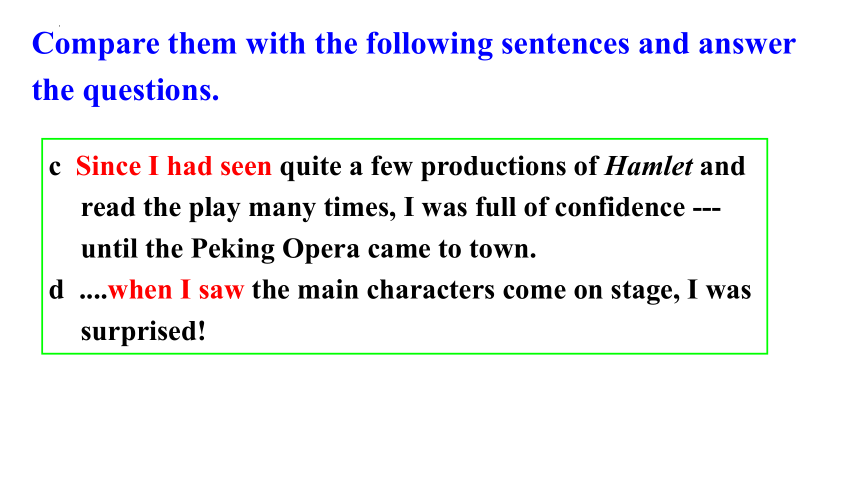
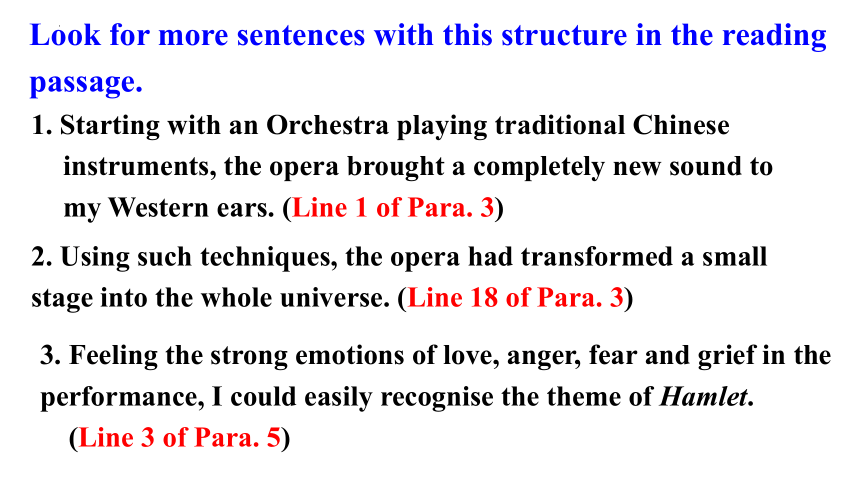
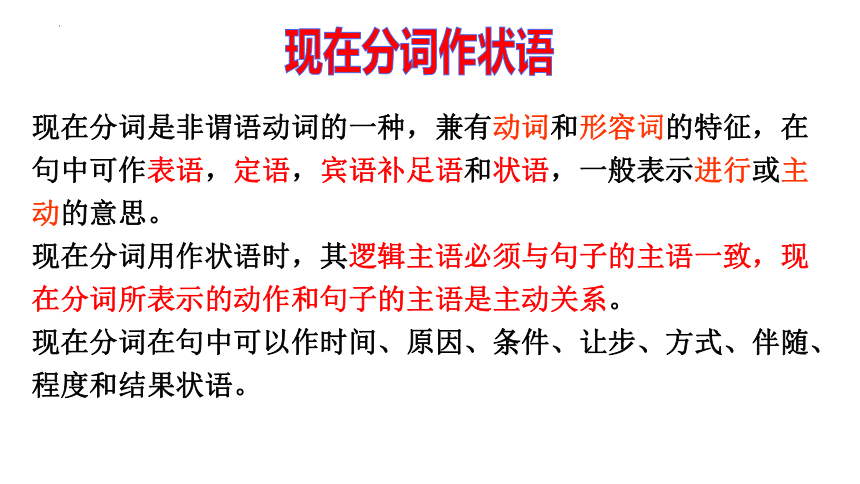
文档简介
(共27张PPT)
Unit 4 Stage and screen
Using language
如何判定谓语与非谓语
Task 1 非谓语动词的解题思路
考点1: The predicate verbs V.S. The non-predicate verbs
判断考查的是谓语动词还是非谓语动词
1. I hope__________ (hear) from you soon.
2. She sat at the window, _________(read) a magazine.
3. I _______ (do) all the cooking for my family, but recently I’ve been too busy to do it.
4. This is the girl who__________ (live) next door.
5. My decision is that all of us ____________________(start) at 6 o’clock tomorrow.
to hear
reading
简单句:
简单句中已经出现了谓语动词 ,填入非谓语。
并列句:
有并列连词but连接两个简单句,填入谓语。
复合句:
从句中缺谓语,填入谓语。
do
lives
will / are going to start
一个句子当中,已经存在一个主句(谓语动词),又没有
连词的情况下, 还有别的动词出现时。
The man took out the key, _________ (open) the door
and entered the room.
2. The man sat there, _________ (read) a book.
3. _______ (work) hard, and you will succeed.
4. The question ___________ (discuss) at the meeting yesterday is of great importance.
5. ___________(improve) his spoken English, Mr. Zhang
goes to the English corner every Saturday.
opened
reading
Work
discussed
To improve
Practise
1. After the founding of the People's Republic of China in 1949, hutong conditions ______________ (improve). But in the recent years, the houses in many hutongs have been pulled down.
2. The list of illnesses __________(cause) or made worse by bad eating habits is frightening.
3. One day, I ___________(call) to examine a ten-year-old dog Belker. The dog’s owners Ron, his wife Lisa, and their little boy _________(name) Shane were hoping for a miracle.
were improved
caused
was called
named
Look at the sentences from the reading passage and answer the questions.
a Having seen quite a few productions of Hamlet and read the play many times, I was full of confidence --- until the Peking Opera came to town.
b ....seeing the main characters come on stage, I was surprised!
Task2
-ing as adverbial
现在分词作状语 P54
Compare them with the following sentences and answer the questions.
c Since I had seen quite a few productions of Hamlet and read the play many times, I was full of confidence --- until the Peking Opera came to town.
d ....when I saw the main characters come on stage, I was surprised!
Look for more sentences with this structure in the reading passage.
1. Starting with an Orchestra playing traditional Chinese instruments, the opera brought a completely new sound to my Western ears. (Line 1 of Para. 3)
2. Using such techniques, the opera had transformed a small stage into the whole universe. (Line 18 of Para. 3)
3. Feeling the strong emotions of love, anger, fear and grief in the performance, I could easily recognise the theme of Hamlet.
(Line 3 of Para. 5)
现在分词作状语
现在分词是非谓语动词的一种,兼有动词和形容词的特征,在句中可作表语,定语,宾语补足语和状语,一般表示进行或主动的意思。
现在分词用作状语时,其逻辑主语必须与句子的主语一致,现在分词所表示的动作和句子的主语是主动关系。
现在分词在句中可以作时间、原因、条件、让步、方式、伴随、程度和结果状语。
1. 作时间状语
Seeing the police, he made a run for the exit.
一看到警察,他就朝出口奔去。
= When he saw the police, he made a run for the exit.
将下面的时间状语从句改写成简单句。
When he walked out of the room, he saw a dog.
____________ out of the room, he saw a dog.
Walking
2. 作原因状语
Being ill, he didn’t go to school yesterday.
因为生病了,他昨天没有上学。
= Because he was ill, he didn’t go to school yesterday.
Not knowing the way, he got lost.
翻译句子:由于不识路,他迷路了。
As he ____________________, he got lost.
didn’t know the way
否定现在分词在其前面加not。
3. 作条件状语
Turning to the left, you will see a school.
= If you turn to the left, you will see a school.
If we ___________, we will get good results.
翻译句子:努力学习, 我们就会取得好成绩。
Studying hard, we will get good results.
study hard
4. 作让步状语
Granting this to be true, we cannot explain it.
虽然我们承认这是事实,却无法予以说明。
= Although we grant this to be true, we cannot explain it.
Knowing it is difficult, I don’t give up.
Although I _________________, I don’t give up.
know it is difficult
5. 作结果状语
The child fell, striking his head against the door and cutting it. (那孩子跌倒了,头碰在门上磕破了。)
The child fell and struck his head against the door and cutting it.
He went abroad, leaving his uncle a big house.
翻译句子:
他出国了,留给他叔叔一间大房子。
He went abroad and ________ his uncle a big house.
left
6. 作伴随状语
The little boy went upstairs, trailing his teddy bear behind him.
那个小男孩走上楼去,身后拖着他的玩具熊。
Emma was sitting in an armchair reading a book.
艾玛坐在一张扶手椅上看书。
翻译下面句子。
他躺在草地上,凝望天空。
He lay on the grass and ___________ the sky.
stared at
He lay on the grass, staring at the sky.
Notes: 现在分词作伴随状语、方式状语和结果状语时,通常可以转换成两个并列的简单句。
8. 作程度状语
现在分词作程度状语的用法有限,相当于程度副词,主要用于加强语气。
He was caught in the heavy rain and got his clothes soaking wet.
他淋了一场大雨,把衣服全部弄湿了。
分析:soaking在这里相当于completely, really 等程度副词。
表示的特征 相当的状语从句
1. 时间
2. 原因
3. 条件
4. 让步
5. 方式/伴随/结果
时间状语从句
原因状语从句
条件状语从句
让步状语从句
并列结构
6. 程度
副词
现在分词作状语的学习中我们还应注意以下两点:
1. 为了使分词作状语表达的意思更明确,可在其 前面加上适当的连词:when, while, once, if, though, unless, even 等。
eg When waiting for the bus, he saw an old friend.
Once losing the chance, you can’t easily find it.
Don’t talk while having dinner.
1) Walking in the park, I met an old friend of mine.
2) We walked as fast as we could, hoping to get there on time.
结论:动词-ing形式所表示的动作和谓语动词同
时发生时,可用_________________________。
2. 动词-ing形式动作和谓语动作的先后顺序
一般形式(doing)
3) Having waited for an hour, I became impatient.
4) Having been to the Great Wall many times,
he didn’t go last week.
结论:动词-ing形式所表示的动作在谓语动词之
前发生,有明显的先后顺序时,可用
______________________________。
完成形式(having done)
补充:独立成分(做状语或插入语)
有些分词短语可作独立成分,用来解释整个句子,不受句子主语的限制。常见的分词短语有:
generally (frankly, honestly…)speaking, talking of(谈到), seeing that(考虑到), judging from(从…判断)。
Generally speaking, girls are more careful than boys.
Judging from his accent, he must be from the north.
Talking of cleaning, it’s about time you cleaned the house.
I. 用动词-ing形式改写下面句子。
1.Tom put down his shopping bag and held out
his hand to the child.
__________________________________________________________________________________
2. When he crossed the road, he kept his eyes on the spot where the accident happened.
__________________________________________________________________________________
Having put down his shopping bag, Tom held out his hand to the child.
He crossed the road, keeping his eyes on the spot where the accident happened.
3. The cat stepped forward and climbed through the hole in the wall.
__________________________________________________________________________________
4. When the bear came out of the forest, it showed its teeth and made a loud noise.
__________________________________________________________________________________
5. He turned away from me and looked out of the window.
_______________________________________________________
Having stepped forward, the cat climbed through the hole in the wall.
The bear came out of the forest, showing its teeth and making a loud noise.
He turned away from me, looking out of the window.
II. 单句语法填空
1. She returned to work_____________(feel) excited.
2.Not____________(know) what to do, the children had to wait for their parents to come back.
3.____________(throw) yourself into your study, you will find it pleasant and productive.
4.____________(do) my homework, I went to watch Peking Opera in the theatre.
5.__________(keep) on your feet, you will make yourself more tired.
feeling
knowing
Throwing
Having done
Keeping
6.More than 50% of the students in China are shortsighted,
(rank) first in the world.7.She didn't pass the exam, (make) her parents upset.8.When (face) so many options, the lion chose to wait instead of attacking the man.9. (show) around the factory,they were very happy.10. (judge) from his behaviour, he must be mad.
11. _______________(work) among the workers for many years, he knew them very well.
12. _________________(praise) for the job, Tom worked harder.
ranking
making
facing
Having been showed
Judging
Having worked
Having been praised
judging from/by 根据……判断;由……推测
《名师同步导学》P112 随堂达标演练
P125 单元语法
Unit 4 Stage and screen
Using language
如何判定谓语与非谓语
Task 1 非谓语动词的解题思路
考点1: The predicate verbs V.S. The non-predicate verbs
判断考查的是谓语动词还是非谓语动词
1. I hope__________ (hear) from you soon.
2. She sat at the window, _________(read) a magazine.
3. I _______ (do) all the cooking for my family, but recently I’ve been too busy to do it.
4. This is the girl who__________ (live) next door.
5. My decision is that all of us ____________________(start) at 6 o’clock tomorrow.
to hear
reading
简单句:
简单句中已经出现了谓语动词 ,填入非谓语。
并列句:
有并列连词but连接两个简单句,填入谓语。
复合句:
从句中缺谓语,填入谓语。
do
lives
will / are going to start
一个句子当中,已经存在一个主句(谓语动词),又没有
连词的情况下, 还有别的动词出现时。
The man took out the key, _________ (open) the door
and entered the room.
2. The man sat there, _________ (read) a book.
3. _______ (work) hard, and you will succeed.
4. The question ___________ (discuss) at the meeting yesterday is of great importance.
5. ___________(improve) his spoken English, Mr. Zhang
goes to the English corner every Saturday.
opened
reading
Work
discussed
To improve
Practise
1. After the founding of the People's Republic of China in 1949, hutong conditions ______________ (improve). But in the recent years, the houses in many hutongs have been pulled down.
2. The list of illnesses __________(cause) or made worse by bad eating habits is frightening.
3. One day, I ___________(call) to examine a ten-year-old dog Belker. The dog’s owners Ron, his wife Lisa, and their little boy _________(name) Shane were hoping for a miracle.
were improved
caused
was called
named
Look at the sentences from the reading passage and answer the questions.
a Having seen quite a few productions of Hamlet and read the play many times, I was full of confidence --- until the Peking Opera came to town.
b ....seeing the main characters come on stage, I was surprised!
Task2
-ing as adverbial
现在分词作状语 P54
Compare them with the following sentences and answer the questions.
c Since I had seen quite a few productions of Hamlet and read the play many times, I was full of confidence --- until the Peking Opera came to town.
d ....when I saw the main characters come on stage, I was surprised!
Look for more sentences with this structure in the reading passage.
1. Starting with an Orchestra playing traditional Chinese instruments, the opera brought a completely new sound to my Western ears. (Line 1 of Para. 3)
2. Using such techniques, the opera had transformed a small stage into the whole universe. (Line 18 of Para. 3)
3. Feeling the strong emotions of love, anger, fear and grief in the performance, I could easily recognise the theme of Hamlet.
(Line 3 of Para. 5)
现在分词作状语
现在分词是非谓语动词的一种,兼有动词和形容词的特征,在句中可作表语,定语,宾语补足语和状语,一般表示进行或主动的意思。
现在分词用作状语时,其逻辑主语必须与句子的主语一致,现在分词所表示的动作和句子的主语是主动关系。
现在分词在句中可以作时间、原因、条件、让步、方式、伴随、程度和结果状语。
1. 作时间状语
Seeing the police, he made a run for the exit.
一看到警察,他就朝出口奔去。
= When he saw the police, he made a run for the exit.
将下面的时间状语从句改写成简单句。
When he walked out of the room, he saw a dog.
____________ out of the room, he saw a dog.
Walking
2. 作原因状语
Being ill, he didn’t go to school yesterday.
因为生病了,他昨天没有上学。
= Because he was ill, he didn’t go to school yesterday.
Not knowing the way, he got lost.
翻译句子:由于不识路,他迷路了。
As he ____________________, he got lost.
didn’t know the way
否定现在分词在其前面加not。
3. 作条件状语
Turning to the left, you will see a school.
= If you turn to the left, you will see a school.
If we ___________, we will get good results.
翻译句子:努力学习, 我们就会取得好成绩。
Studying hard, we will get good results.
study hard
4. 作让步状语
Granting this to be true, we cannot explain it.
虽然我们承认这是事实,却无法予以说明。
= Although we grant this to be true, we cannot explain it.
Knowing it is difficult, I don’t give up.
Although I _________________, I don’t give up.
know it is difficult
5. 作结果状语
The child fell, striking his head against the door and cutting it. (那孩子跌倒了,头碰在门上磕破了。)
The child fell and struck his head against the door and cutting it.
He went abroad, leaving his uncle a big house.
翻译句子:
他出国了,留给他叔叔一间大房子。
He went abroad and ________ his uncle a big house.
left
6. 作伴随状语
The little boy went upstairs, trailing his teddy bear behind him.
那个小男孩走上楼去,身后拖着他的玩具熊。
Emma was sitting in an armchair reading a book.
艾玛坐在一张扶手椅上看书。
翻译下面句子。
他躺在草地上,凝望天空。
He lay on the grass and ___________ the sky.
stared at
He lay on the grass, staring at the sky.
Notes: 现在分词作伴随状语、方式状语和结果状语时,通常可以转换成两个并列的简单句。
8. 作程度状语
现在分词作程度状语的用法有限,相当于程度副词,主要用于加强语气。
He was caught in the heavy rain and got his clothes soaking wet.
他淋了一场大雨,把衣服全部弄湿了。
分析:soaking在这里相当于completely, really 等程度副词。
表示的特征 相当的状语从句
1. 时间
2. 原因
3. 条件
4. 让步
5. 方式/伴随/结果
时间状语从句
原因状语从句
条件状语从句
让步状语从句
并列结构
6. 程度
副词
现在分词作状语的学习中我们还应注意以下两点:
1. 为了使分词作状语表达的意思更明确,可在其 前面加上适当的连词:when, while, once, if, though, unless, even 等。
eg When waiting for the bus, he saw an old friend.
Once losing the chance, you can’t easily find it.
Don’t talk while having dinner.
1) Walking in the park, I met an old friend of mine.
2) We walked as fast as we could, hoping to get there on time.
结论:动词-ing形式所表示的动作和谓语动词同
时发生时,可用_________________________。
2. 动词-ing形式动作和谓语动作的先后顺序
一般形式(doing)
3) Having waited for an hour, I became impatient.
4) Having been to the Great Wall many times,
he didn’t go last week.
结论:动词-ing形式所表示的动作在谓语动词之
前发生,有明显的先后顺序时,可用
______________________________。
完成形式(having done)
补充:独立成分(做状语或插入语)
有些分词短语可作独立成分,用来解释整个句子,不受句子主语的限制。常见的分词短语有:
generally (frankly, honestly…)speaking, talking of(谈到), seeing that(考虑到), judging from(从…判断)。
Generally speaking, girls are more careful than boys.
Judging from his accent, he must be from the north.
Talking of cleaning, it’s about time you cleaned the house.
I. 用动词-ing形式改写下面句子。
1.Tom put down his shopping bag and held out
his hand to the child.
__________________________________________________________________________________
2. When he crossed the road, he kept his eyes on the spot where the accident happened.
__________________________________________________________________________________
Having put down his shopping bag, Tom held out his hand to the child.
He crossed the road, keeping his eyes on the spot where the accident happened.
3. The cat stepped forward and climbed through the hole in the wall.
__________________________________________________________________________________
4. When the bear came out of the forest, it showed its teeth and made a loud noise.
__________________________________________________________________________________
5. He turned away from me and looked out of the window.
_______________________________________________________
Having stepped forward, the cat climbed through the hole in the wall.
The bear came out of the forest, showing its teeth and making a loud noise.
He turned away from me, looking out of the window.
II. 单句语法填空
1. She returned to work_____________(feel) excited.
2.Not____________(know) what to do, the children had to wait for their parents to come back.
3.____________(throw) yourself into your study, you will find it pleasant and productive.
4.____________(do) my homework, I went to watch Peking Opera in the theatre.
5.__________(keep) on your feet, you will make yourself more tired.
feeling
knowing
Throwing
Having done
Keeping
6.More than 50% of the students in China are shortsighted,
(rank) first in the world.7.She didn't pass the exam, (make) her parents upset.8.When (face) so many options, the lion chose to wait instead of attacking the man.9. (show) around the factory,they were very happy.10. (judge) from his behaviour, he must be mad.
11. _______________(work) among the workers for many years, he knew them very well.
12. _________________(praise) for the job, Tom worked harder.
ranking
making
facing
Having been showed
Judging
Having worked
Having been praised
judging from/by 根据……判断;由……推测
《名师同步导学》P112 随堂达标演练
P125 单元语法
